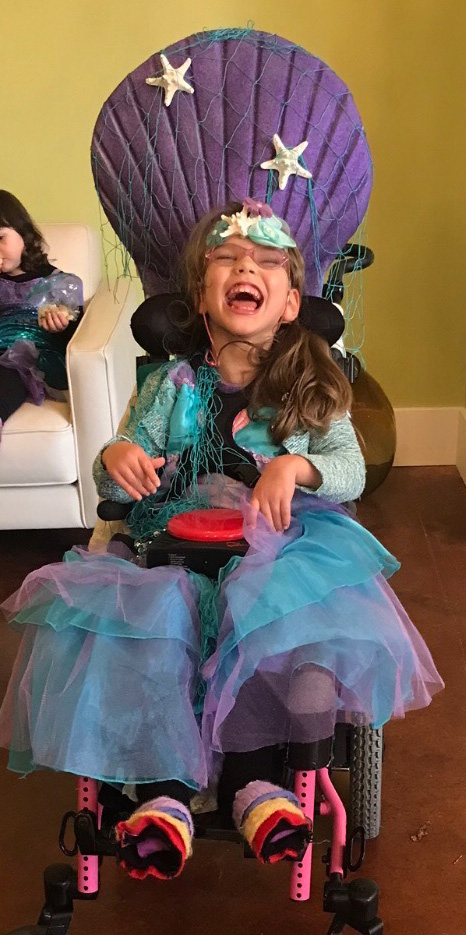Home / About / Center Grants / UCEDD /
 The Center for Technology and Disability (CTD) works to advance assistive technology (AT) and accessible information systems to support individuals with disabilities in accessing opportunities in education, their community, and employment. CTDS is an interdisciplinary program that conducts research, education, advocacy, and informatics projects related to AT and accessible information systems.
The Center for Technology and Disability (CTD) works to advance assistive technology (AT) and accessible information systems to support individuals with disabilities in accessing opportunities in education, their community, and employment. CTDS is an interdisciplinary program that conducts research, education, advocacy, and informatics projects related to AT and accessible information systems.
An AT device is any item or piece of equipment used to maintain or improve the functional capabilities of a person with a disability. Many high- and low-tech devices are now available to assist people with disabilities with daily living tasks, communication, education, work, and recreation. Examples include wheelchairs, computers, assistive listening devices, magnification systems, and augmentative communication devices. Accessible information systems include products such as software applications, telecommunications, multi-media, and closed products such as copiers and fax machines that are accessible to individuals with disabilities.
Center for Technology and Disability
CTD: Projects
Contact: Mark Harniss (mharniss@uw.edu)
Core Function: Technical Assistance and Outreach Training
The Georgia Institute of Technology’s (Georgia Tech) Center for Inclusive Design and Innovation (CIDI), in collaboration with the University of Washington’s Center for Technology & Disability Studies (CTDS), develop the Accommodation Expert Support System for Aging Well (ACCESS for Aging Well), a dynamic accommodation system with web-based and mobile functionality that help older adults with disabilities and their formal and informal caregivers and service providers work together to identify accommodations that allow older adults with disabilities to continue to live in their community of choice. ACCESS for Aging Well uses intelligent algorithms to prioritize recommendations within a person-centered service framework. These algorithms is be based on existing data from project partners, collected data from use of the system, and review of state-of-the-science evidence in the scientific literature and practitioner input. This project builds upon several current proof of concept development projects at CIDI and continue through the Proof of Product and Proof of Adoption stages of development.
Contact: Mark Harniss (mharniss@uw.edu), Kurt Johnson (kjohnson@uw.edu)
Core Function: Information Dissemination, Technical Assistance and Outreach Training
The purpose of the ADA Knowledge Translation Center (ADAKTC) is to ensure that information and products developed and identified through the 10 regional centers of the ADA National Network (ADANN) are of high quality, based on the best available research evidence, and are deployed effectively to multiple key stakeholders. The ADAKTC facilitates coordination, organization, and collaboration among the ADANN centers and generates new knowledge about optimal methods to enhance stakeholder’s use of knowledge about their rights and responsibilities under the ADA. Stakeholders include: employers, researchers, educators, policy makers, staff of state and local government agencies, individuals with disabilities, family members, and project staff in the ADA regional centers and other related federal and privately-funded organizations.
To achieve this purpose the ADA Network – KTC will:
- Optimize the efficiency and impact of the ADA National Network’s training, technical assistance, and information dissemination.
- Increase the awareness and use of available ADA-related research findings to inform behavior, practices, or policies that improve equal access in society for individuals with disabilities.
- Increase awareness and utilization of ADA-related research findings by appropriate ADA stakeholder groups.
- Improve understanding of ADA stakeholders’ need for and receipt of ADA Network Services over time, including services to address emerging issues related to compliance with ADA requirements.
Contact: Mark Harniss (mharniss@uw.edu), Kurt Johnson (kjohnson@uw.edu)
Core Function: Technical Assistance and Outreach Training
The Center for Technology and Disability Studies (CTDS) provides technical assistance, policy analysis, and program implementation to the Washington State Department of Services for the Blind(DSB), primarily related to its Independent Living for the Blind Program (IL). IL empowers individuals with vision loss to live independently in their homes and communities. CTDS staff members develop and manage subcontracts with a statewide network of community providers who provide the skills, the tools, and the confidence individuals with recent vision loss need to thrive. In support of the IL program, CTDS staff provide technical assistance regarding IL best practices, develop and implement an online case management system, and compile federal and state reports on DSB’s behalf.
Contact: Sharan Brown (sbrown@uw.edu), Mark Harniss (mharniss@uw.edu)
Core Function: Research and Evaluation
This project aims to improve interactions between incarcerated individuals with Traumatic Brain Injury (TBI) and front line staff of the Washington State Department of Corrections (DOC). Specifically, the project aims to help front line staff understand what a TBI is, how offenders might be affected by TBI, what they could do that would help in day-to-day management of problems faced by offenders with TBI, how TBI might affect engagement in treatment programs, how TBI affects compliance with DOC rules and regulations, and how TBI might affect transition from corrections to community living. The project proposes to effect change at two levels in the DOC. The first is to increase awareness and knowledge about TBI system-wide. The second is to develop and pilot intensive knowledge translation activities with front line staff who work with specific target populations (e.g., veterans, or women, or individuals with developmental disabilities) in order to translate knowledge into practice. These activities will be evaluated and used to develop best practices that can be generalized to other correctional facilities within the DOC.
Contact: Kurt Johnson (kjohnson@uw.edu)
Core Function: Clinical Services, Technical Assistance and Outreach Training
The UW Employment Program works to support competitive employment for people with intellectual and developmental disabilities. In order to accomplish this mission, UWEP staff address three major goals: 1) To develop and implement new or expanded programs relating to employment of persons with disabilities; 2) To provide outreach and marketing of all program services to the community; and 3) To provide direct service to clients with ID and DD.
UWEP staff members serve and advocate for adolescents and adults with ID and DD. They also provide direct services to clients and work to ensure successful and equitable employment through working with employers, parents, agencies, and other support personnel. Direct services include job development, job placement, job training, and continued employment support. All employment is in integrated settings.
UWEP collaborates with numerous agencies to provide employment services to individuals with developmental disabilities. UWEP works with the Division of Vocational Rehabilitation, King County Division of Developmental Disabilities, and is a member of the Seattle Chamber of Commerce.
Other activities include assessment and career exploration services for adolescents with disabilities that help clients acquire the social skills necessary to participate in employment, identify potential career options, and to obtain real life, paid employment experience.
Contact: Alan Knue (aknue@uw.edu)
Core Function: Technical Assistance and Outreach Training
The mission of Washington Assistive Technology Act Program (WATAP) is to provide a comprehensive continuum of services and resources to help Washingtonians with disabilities of all ages to make informed decisions about assistive technology (AT), and to provide alternative means of acquiring the AT they need. WATAP serves not only individuals with disabilities, but also their circle of support including family members, employers, employment service providers, educators, health care providers, social service providers, and others seeking AT expertise in all areas of life, but especially in education, employment, and community living. WATAP is part of the Center for Technology and Disability Studies (CTDS) and is guided by a consumer-majority advisory council. WATAP provides hands-on demonstrations and short-term loans of assistive technology devices to help potential users make informed decisions about using such devices and related services. Additional services offered include information and referral, training, and technical assistance.
WATAP, Timberland Regional Library Systems, and the San Juan Island Library have partnered to offer to library members the opportunity to see and try a small selection of assistive devices to help with a variety of daily tasks. Members of the Library Systems may borrow any of the devices through the Library System catalog. Several State Agencies, including the Special Education Technology Center, the Division of Vocational Rehabilitation (DVR), Department of Services for the Blind (DSB), and Aging and Long-term Support Administration (ALTSA) coordinate with WATAP’s Device Borrowing program to provide short-term loans of assistive technology to special education teachers, speech-language pathologists, rehabilitation counselors, occupational/ physical therapists, case managers, homecare support personnel, and other technology specialists throughout Washington State.
WATAP partners with the Northwest Access Fund to provide low-interest financial loans for the purchase of assistive technology devices and services through the Assistive Technology Loan and matched savings program (Individualized development Accounts or IDAs). WATAP provides support to local community reuse providers, Bridge Disabilities Ministries Meyer Mobility Center and the Seattle Hearing, Speech, and Deafness Center (HSDC), for the purposes of expanding capacity for their device reuse programs. The Meyer Mobility Center provides reused nobility and durable medical equipment at no cost and HSDC offers a unique hearing aid reuse program. WATAP coordinates the Evergreen Reuse Coalition, a Washington State reuse network, which seeks to make a positive impact to the environment, quality of life of consumers, and cost savings to consumers through effective reuse of assistive devices. Through partnership with the Perkins School for the Blind, WATAP provides telecommunications equipment and associated support and training to eligible applicants who have vision and hearing impairments through iCanConnect WA, Washington’s National Blind Equipment Distribution Program funded by the Federal Communication Commission.The mission of Washington Assistive Technology Act Program (WATAP) is to provide a comprehensive continuum of services and resources to help Washingtonians with disabilities of all ages to make informed decisions about assistive technology (AT), and to provide alternative means of acquiring the AT they need. WATAP serves not only individuals with disabilities, but also their circle of support including family members, employers, employment service providers, educators, health care providers, social service providers, and others seeking AT expertise in all areas of life, but especially in education, employment, and community living. WATAP is part of the Center for Technology and Disability Studies (CTDS) and is guided by a consumer-majority advisory council. WATAP provides hands-on demonstrations and short-term loans of assistive technology devices to help potential users make informed decisions about using such devices and related services. Additional services offered include information and referral, training, and technical assistance.
For additional information about the Center for Technology and Disability, please visit their website.
Center for Technology and Disability
Would you like to visit/train/research/learn more about us?

What’s In Our Stories?
I am text block. Click edit button to change this text. Lorem ipsum dolor sit amet, consectetur adipiscing elit. Ut elit tellus, luctus nec ullamcorper mattis, pulvinar dapibus leo.

